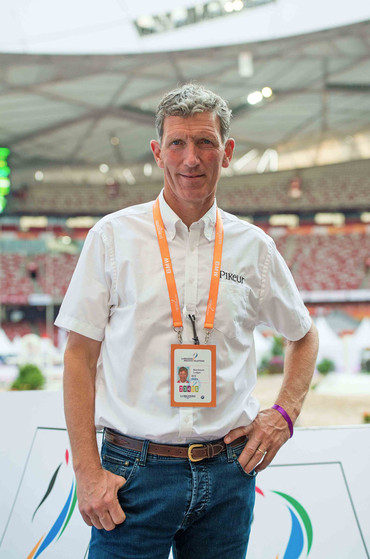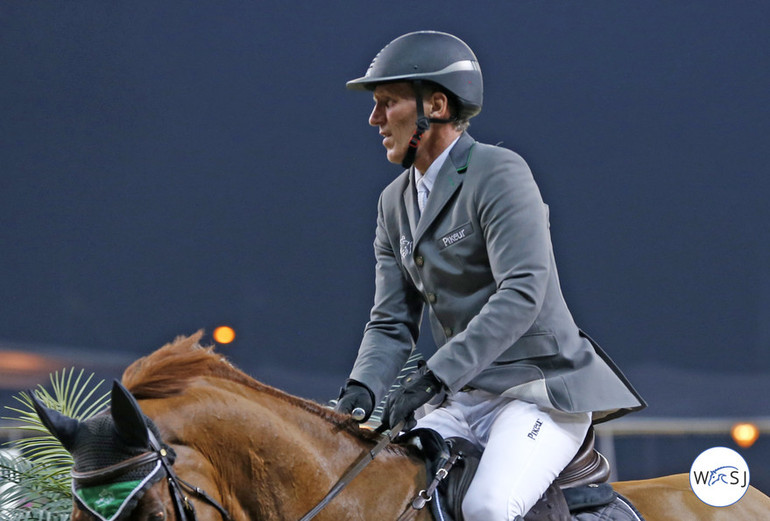 Ludger Beerbaum at the Bird’s Nest, the Olympic Stadium in Beijing/China, where the Longines Equestrian Beijing Masters 2017 is being staged from October 13th-15th. Photo (c) Longines Equestrian Beijing Masters/Arnd Bronkhorst.
Ludger Beerbaum at the Bird’s Nest, the Olympic Stadium in Beijing/China, where the Longines Equestrian Beijing Masters 2017 is being staged from October 13th-15th. Photo (c) Longines Equestrian Beijing Masters/Arnd Bronkhorst.
The 7th Longines Equestrian Beijing Masters is being held from Friday to Sunday in the Olympic Stadium in Beijing. The German equestrian sport icon Ludger Beerbaum has been on board as a co-organiser from the very start and he revealed in an interview how his commitment in China began, which challenges the Chinese equestrian sport has to overcome and what the spectators can look forward to at the weekend.
Mr. Beerbaum, you have been asserting yourself in China for over ten years already. How did your involvement come about?
Ludger Beerbaum: "The first contact was at the turn of the year 2005/2006, in other words two years before the Olympic Games in Beijing. At the time, the Chinese Equestrian Sport Federation approached me to ask for my support in setting up a team of riders for the Olympic Games. As the host country, China was namely already pre-qualified and they wanted to take advantage of this opportunity. Two years for such an intention was of course an ambitious timeframe, but ultimately a team was formed and that is how our cooperation kicked off."
For Germany it would have been inconceivable not to put forward a team. Because when it comes down to the key words Olympic Games, equestrian sport and Germany, it is always about winning medals. Which role does the equestrian sport play in China in comparison to top European nations?
Beerbaum: "Let’s put it like this: Europe has a 100-year old history of equestrian sport, China’s is perhaps only 10 years old. That gives one a rough indication of the sporting level, the horses, the riders and also the entire horse industry. But there has been a lot of development in China’s equestrian sport history over the course of these last ten years, in comparison to the rest of the world the development has in fact probably been much faster. In 2006, as the organiser of the Olympic Games it was more a matter of feeling called up on to see how once could integrate the equestrian sport here in some form. There still wasn’t a World Cup or international shows. I am not even sure to what extent the Equestrian Sport Federation was even organised at the time. But there has been enormous progress since then, from scratch up to international show level, so to say. In the meantime, there are also an incredible amount of riding stables distributed across China. It is of course still the case that China’s top athletes are still not at the same level as those of the top European nations, but one can say that the sport has become extremely popular within this short space of time."
In the scope of the Longines World Equestrian Academy you actively assert yourself for the sustainable development of the equestrian sport in China. What exactly is this project about?
Beerbaum: "The fact is that there is a lack of basic knowledge in China, particularly at the basic level: How horses are kept, how they are looked after, how they are shod. That is why Longines founded the Academy and now we have been working together to promote the Chinese equestrian sport for the last one and a half years. Here, it is not primarily about producing top athletes, but about bundling the entire palette of the equestrian sport in the Academy and transferring knowledge from Europe to China. We achieve this on the one hand by sending European experts to the location in Beijing, for example blacksmiths or veterinarians. On the other hand we invite young Chinese people to Germany to the location in Riesenbeck, so that the riders can gain experience at shows and the grooms can learn how to take care of the horses properly. Hence, the Academy starts with the very basics of our sport, in other words at the point where there is still a great need to catch up in China."
You stopped actively riding for the German team last year. Have you dedicated the time you have won as a result more in the Academy?
Beerbaum: "I haven’t actively stopped riding altogether. As a result of withdrawing from the national team, I compete at perhaps five shows less a year, but I still travel around 30 weekends a year. I have indeed had a little more time for the Academy this year, which I predominantly used to organise training courses for China, which I wasn’t even present on-site for. Nevertheless, I still visited Beijing two times more often this year than in the previous years."
Do you have a long-term goal for your commitment in China?
Beerbaum: "I don’t actually want to speak of long-term but of mid-term, preferably short-term. With regards to the sport, the goal - and we have clearly expressed this together with the Chinese Federation and the World Equestrian Federation – is for a Chinese team to qualify for the Olympic Games, with a view to Tokyo, Paris and Los Angeles."
Which challenges have to be overcome up until then?
Beerbaum: "First of all, of course, we need top athletes, who are not yet available. It takes a while for someone to be able to ride like Marcus Ehning or Scott Brash. Another theme of course is the very strict quarantine regulations in China, which makes it impossible to send horses back and forth between China and Europe. We have been working on this issue for years already and have been drilling away at the authorities, but we haven’t achieved the desired result as yet. When we finally achieve this, I expect the rest will all come together within a very short space of time. Then we can also transfer the industry to China and the knowledge exchange will occur much faster."
This would mean for the Longines Equestrian Beijing Masters that the international top stars would finally be able to compete on their own horses rather than having to borrow Chinese horses. On Friday, the seventh edition of the show that you co-initiated begins already. Tell us a little about the Masters!
Beerbaum: "The first thing that springs to mind in terms of what makes the show so special is the location: The historic location of the Olympic Stadium in Beijing is unique. Alongside the Maracanã in Rio de Janeiro or the showgrounds of the CHIO Aachen, the Bird’s Nest is one of the venues that everyone knows, even if they don’t know anything else about the sport. It is an incredible feeling every time one enters the stadium. That is what turns the Beijing Masters into a very special event for the athletes. Many things have been optimised in terms of the show’s organisation over the past seven years: At the beginning the Chinese Federation had no experience at all, but through the cooperation with the CHIO Aachen team from Germany and Dashing Equestrian from China, the Beijing Masters has also become more professional from year to year regarding its organisation. This is also noticeable from the marketing: There are more and more sponsors, the attendance figures rise constantly. I have just heard this morning that double the amount of tickets were sold in the advance sales compared to last year. I think one can say that the Beijing Masters was a very delicate plant at the beginning, which developed very slowly at first, but which now keeps on growing and growing."
In which areas has the show grown this year?
Beerbaum: "Top riders were always among the field of international competitors and this year there is once again an excellent line-up. But this time the national line-up is also extremely strong. I think there are some candidates among the Chinese riders, who could come under the top rankings in the Grand Prix on Sunday. Another new aspect is that the spectators are going to be even closer to the sporting action, because we have placed the arena as close as possible to the stands. We are hoping this will create an even more intense atmosphere. Overall, I think, we can look forward to a fantastic show weekend!"
Text © Longines Equestrian Beijing Masters // Picture © Longines Equestrian Beijing Masters / Arnd Bronkhorst









